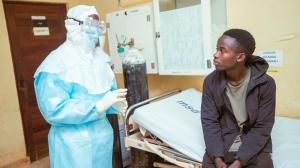WHO supports development of Tanzania’s National Action Plan to champion health security.
Arusha: Tanzania conducted Joint external Evaluation (JEE) in 2023 with results showing that 73% of the indicators had demonstrated developed capacities between the score levels of 3 to 5. Key recommendations on interventions that could move the country higher and better prepared to prevent, detect, and respond to health threats and emergencies were made.
Follow up to the evaluation and other recent assessments done related to International Health Regulation (IHR 2005), the Ministry of Health (MOH) in collaboration with the Prime Minister’s Office (PMO) took step to develop the national action plan for health security (NAPHS 2024 -2028), a country strategic plan containing various multisectoral and multilevel activities that will be implemented over a period of time, usually between 3 to 5 years to strengthen preparedness against public health threats and emergencies.
Thanks to the financial support from Ireland Government, World Health Organization (WHO) in collaboration with the Ministry of Health (MOH) and the Prime Minister’s Office (PMO), organized two multisectoral workshops to develop and cost the National Action Plan for Health security were convened. The aim was to better prepare technically and financially to prevent, detect and respond to all health hazards and emergencies.
In her remark, Dr Grace Saguti, Dr Grace Saguti, Emergency and Preparedness Cluster Lead at WHO, noted that the national action plan being a key strategic document that guide country actions and interventions toward building capacity and capabilities across sectors and at all levels against public health threats and events is extremely important.
“WHO will continue to support the Government through National action plan on health security and other plans implementation to ensure the population are safe and better protected from health emergencies”, she added.
The implementation of International Health Regulation (IHR 2005) is akin upon successful development and implementation of NAPHS.
The Ministry of Health, represented by Dr Vida Mmbaga, she expressed the government acknowledgement to WHO and partners in supporting the health and well-being of its population and protecting them from public health emergencies and the development of the NAPHS as well as successfully conducting its second JEE.
“The Ministry is looking forward to having a plan that will assist the country to achieve its targets, in terms of capacity and capabilities to better protect its population from public health emergencies’’, noted Dr Mmbaga.
Tanzania seeks to build on the achievements from its past investments in health security and improve on its health systems and IHR core capacities performance across all levels and sectors, and particularly at the subnational, as it implements the NAPHS over the next 5 years.
Dr Salum Manyata, representing the Prime Minister’s Office (PMO), emphasized government commitment to ensure that the multisectoral coordination, collaboration, and leadership required is provided to ensure the plan is implemented to improve health security.
‘There is need for sustain efforts and collaborations among stakeholders in order to achieve the goal of national and global health security’’, stressed Dr Manyata.
Tanzania was among the first set of countries to develop a NAPHS in 2016. The implementation had gone well, though with few challenges, particularly limited funding and inadequate multisectoral coordination at the subnational level. To also address the gaps observed with the previous NAPHS, a stakeholder workshop as part of advocacy to ensure inclusive planning, development, and implementation was held last year.
This particular workshop on the development and costing workshops brought together experts from the Ministry of Health, Prime Minister’s Office (PMO), President’s Office – Regional Administration and Local Government (PO-RALG), Ministry of Fisheries and Livestock, Ministry of Finance, participants from the subnational, representatives of all 19 IHR core capacity technical areas, academia, research institutions, and other NAPHS stakeholders including FAO, USAID, US CDC.
Communications Officer
WHO Country Office, United Republic of Tanzania
Tel: +255 744377899 (Phone)
Email: adjeidum [at] who.int (adjeidum[at]who[dot]int)
Tel: +255 754 287 875
Email: sagutig [at] who.int (sagutig[at]who[dot]int)
